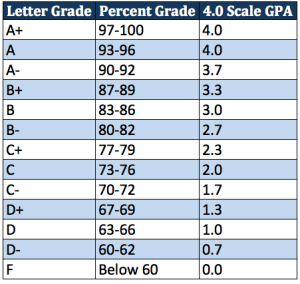Every college student has major courses they need to take to graduate with that degree. There’s little to no flexibility in scheduling these classes each year.
Some students barely manage to do homework, preparing for tests, and doing written assignments, so they address an essay helper from the respective service. This help is crucial for those who focus on learning first of all.
During my college years as an English major, if I reminder right, I needed to have 42 credits of English classes (out of a total 128 credits for graduation). And then a certain amount of related courses on top of it.
My major courses amounted to around three courses out of five per semester.
However, most universities will also require undergraduates to take a certain number of classes across multiple disciplines outside of their major. Here is where you have the flexibility to take a class on Asian American Relations or the African Economy, for example.
Although these courses are outside their major, successful students use this free decision to choose classes that will serve them the rest of their personal and professional life.
For example, engineers take a class to touch up on their communication skills. And business majors take an English class to improve their writing. Many students also choose to use an essay writing service.
Average students pick these classes without a second thought and ultimately waste them.
Don’t let that be true for you.
If you’re looking for classes to take in college to make the most of your education, look no further than here. This list of courses below runs the gamut from all different subjects.
[activecampaign form=3]
1) Speech Communication
Forget about public speaking for a second (because how often do you have to do that?) and focus on this. Unless you plan on working by yourself without any human interaction, the way you speak is critical to your success.
Say you’re interviewing for an internship or full-time job. You can have all the qualifications, but if you can’t communicate that to the employer than you’ve lost. Good interview answers demand a convincing pitch backed with support. This example proves it.
And communication is one of the four skills employers want for good reason. They can teach new employees the skills needed for the job, but it’s much harder to teach communication and people skills.
What you say and how you say it can’t be underrated!
That’s why college students who practice their speaking and body language in a communications course have no problem later on delivering under the interview or job pressure.
They learn to recognize their audience, what’s important to them, and how to appeal to this audience in a clear and convincing manner.
Sure these students might mess up at first. But it’s better to struggle in a class when everyone else is struggling compared to the real world when you have one shot to express yourself.
And practicing communication in a course breeds confidence down the road.
This confidence in how they speak becomes their ticket to promotions, raises, and career success. Because at the office Christmas party or in a hot deal with a client, your communication skills can win the day.
The results aren’t only career-related. Learning what to say to get your point across in the best manner will improve your friendships and romantic life. People are immediately attracted to those who are well-spoken and confident.
Finally, it’s true that if you have experience and confidence in how you talk, doing a speech in front of a 1,000-person audience is a whole lot less scary.
There are plenty of reasons to improve how you speak and no reasons not to, and for that it made my list.
2) Psychology
Psychology is a class that’s equally entertaining as it’s informative.
Case studies like the Stanford prison experiment will blow your mind more than watching a thriller movie. Psychological experiments like that one fascinate me because they happened in real life with real people! Not a computer simulation.
And learning about the human mind from your professor won’t put you to sleep during the lecture. You’ll begin to understand:
- Your own self-awareness
- Why humans behave a certain way
- How to understand what people feel about a situation when it’s not clear
- How to listen and respond with their interests in mind
- Sympathy and empathy for all types of people
- A more open worldview
Psychology plays a major role in understanding emotional intelligence as well. Emotional intelligence is rarely talked about for college and career success, yet it should be.
Because there’s an argument your EQ is more important than your IQ. I may be going out on a limb there, but I’m don’t have a problem doing it.
When you know exactly how to understand, respond, and work together well with other people, you become a difference maker. EQ is all about creating a positive effect on people, and do that enough times and people will come around to pay you back in huge ways!
Specifically, psychology helps you understand your professor in office hours to build a positive relationship. It bridges into marketing and sales by understanding the mind, needs, and desires of your customers. It helps managers make hiring decisions and assign employees to the right teams to bring out their strengths.
The best leaders are experts in inspiring their troops based on emotional connection.
Whereas information is everywhere now with iPhones and the internet, it’s still valuable but less valuable than it was in 1990. Ask me a question and I’ll know the answer in five seconds thanks to Google.
I didn’t even scratch the surface on this subject that has a direct influence on every aspect of our lives. Writing this fired me up to dedicate a future blog post on emotional intelligence.
For now, just think about how much could you benefit from signing up for a college course in psychology?
3) Personal Finance
I’m convinced, without a doubt, that all college students should take a class in personal finance.
Yes, every last college student! All 15 million-plus of you, whether you are dirt poor or have a trust fund—and everyone in between.
Not because personal finance is a regular blog post topic on Take Your Success. And not because I wrote a book on personal finance for young adults titled Freedom Mindset.
College students should develop smart money management knowledge because of this:
- From 1978 (when our parents were in college) to 2012, college tuition rose 1,120%
- College tuition is outpacing inflation
- College textbooks cost 1,041% more than they did in 1977
- The total cost of college has shown no signs of getting cheaper in the future
- Debt limits freedom, causes anxiety, and gets in the way of a happier life
- Saving money isn’t enough, you need to invest wisely
Getting an education is important and data shows college grades make much more over time than non-college grades. So this debt is not all for loss.
But the reality is if you don’t have smart money management skills, you let your defenses down to a host of troubles. It doesn’t matter how high your salary is if it’s money in and money out as you drown in a pool of debt.
Money affects your free time, ability to travel, whether you can choose the job you love over the one that pays more, when you retire, and so much more. You also can’t help other people financially if you’re chained to debt yourself.
Taking a personal finance class will help you master your money by tackling debt and investing it so it begins to work for you. It’s a relief to sleep easy knowing your finances are secure and net worth is growing.
4) Computer Science
One of my biggest pet peeves is when people put “Skilled in Microsoft Word” on their resume. That should be a given nowadays!
Since computers run the world for the most part, there might not be a more practical skill than computer science. A digital workplace and economy gives way to workers with digital skills.
By taking a college-level computer science course, you’ll learn the basics of computers and web design for rest of your career. As computers advance, your lessons in this computer course will pave the way for mental connections to keep up with the changes.
That’s why it’s not even about learning the specific program like C++ or Java, because those can be replaced at any time. It’s getting your brain comfortable with computer technology, and as it changes you’ll be more quickly to adapt than those without the same experience.
To help you understand this concept, think of social media.
Those who started on MySpace and then moved to Facebook had less of a learning curve adding friends and uploading pictures on the new platform. Those who started social media on Facebook had a more difficult learning curve because of their inexperience.
It’s the same with computer science.
These free online learning sites offer tons of valuable resources in computer science classes. My friend took a course at MIT for the fun of it, for no charge! So if you don’t want to take them at your university, there’s your shot.
And my last effort to convince you is a quote from Steve Jobs who said, “I think everybody in this country should learn how to program a computer—because it teaches you how to think.”
Because of the versatile advantages and what Steve Jobs said, computer science is on the required classes list.
5) Professional Writing
I took a technical writing course during my junior year. On the first day, I found out that engineer majors comprised most of the class because of an engineering requirement.
And in this writing course, just like every similar one, we had to peer review papers. Going into it I suspected their writing would be shaky, but that’s an understatement.
Engineer students misused the words “they’re” and “there” and “it’s” and “its.” Had weak or no thesis statements. And wrote like a high schooler.
Now I’m not saying I’m better than these engineers, because put me in an engineering exam and I’d look more foolish than them. But my point is engineering knowledge isn’t present in every job like writing knowledge.
Writing skills are required from big proposals to little emails to colleagues.
It’s not only engineers either. A large percentage of college students struggle to communicate effectively. This deficiency is across many disciplines.
If this describes you, you should feel frightened. There’s not a single field where solid writing skills aren’t important. You name it, and being able to communicate by written text will help you. Being unable to do this will hurt you.
Your grad school application requires a written personal statement. Your letter of recommendation request to professors needs to be well-written.
After school, each email to your future coworkers, managers, and clients all reflects back on you. Compelling emails create a positive impression of intelligence and trust. Poorly written emails convey ignorance and don’t persuade.
Some of you might say I’m biased because of my English degree. But I’m not biased because of the degree, but its results. My English major has helped me start this blog and write two books.
Your writing skills will get revamped after practicing writing and understanding grammar under a professor for 15 weeks. And after that course, continue to read and write to stay sharp.
Being able to write will always stick with you, and why it’s a must-take college course.
6) Statistics
Data is everywhere in 2016. And it will continue to only become more important in the future.
Whether they recognize it or not, every organization utilizes data and analytics to make decisions.
The local movie theater uses attendance numbers and profit data to decide if they should keep 100 traditional seats or move to 60 lounge seats for a better visitor experience. International insurance companies rely 100% on data to determine potential risk and rates. And network security companies receive large contracts to secure an organization’s data.
That’s why having the mental ability to make sense of figures, analyze current and future trends, and make positive decisions for your employer after graduation will all come back to your statistics course.
You don’t need to be an expert in statistics to create data graphs and organize big data. There are many computer programs that can do most of the work for you.
What’s helpful is to have a solid understanding of data, how easily it can be manipulated, and what to do with it. Taking a stats course for one semester is enough to gain that basic understanding.
And then you’ll not only be a better job candidate, but also a better citizen.
When the media comes out with some crazy statistic claiming causation between ants and headaches, you can refute it and call it correlation. Or if a research finding seems sketchy, you can look into the testing environment and how the data came to be. If you understand statistics, you’ll have a better eye for the politician who is talking straight and the one who is talking out of the side of their mouth based on their statistical interpretations.
Data is a powerful tool for those who know how to wield it. Take a course and you’ll learn skills you can utilize every day.
7) Philosophical Logic
How often do you spot a false premise or logical fallacy? If your brain’s not trained in a college course, then it’s easy to fall for all sorts of arguments that don’t follow a pattern of reasoning.
The red herring, ad hominem argument, bandwagon fallacy, post hoc argument, and many more in this master list present themselves as fact if you’re not familiar. And too often they’re accepted as truth in arguments, political debates, and advertisements.
Taking a class will help you learn logic, reasoning, and Aristotle’s three rhetorical appeals of ethos, pathos, and logos. These are at the core of any persuasive argument.
I urge all future lawyers (logic is all over the LSAT) and business people to take a class in logic because that knowledge will be paramount throughout your career.
Without any background in logic to help them, many students and young professionals make mistakes based on false assumptions and their emotions.
Again, this is another class that helps you think (imagine that) and protects you from being blinded by deception or false claims, wherever they come from.
Making your mind sharper keeps it healthy and presents a more reasonable thinking pattern throughout your life.
Just don’t blame me or that course for when you come back home and are indestructible in arguments with your parents.
8) STEM
Ok, I cheated here by picking four different classes: science, technology, engineering, and math.
But you should take one of them early on in your college career, and here’s why: It’s all but impossible to take a STEM course on your own or after you graduate.
The STEM courses require professors, expensive machines and tools for labs, and complex group problems that you can’t replicate on your own. Meaning this is most likely the last opportunity in your life to go in-depth in one of these fields.
(Plus, if you did decide to switch to a STEM major, these are the hardest to switch to because of their heavy requirements and strict structure. Better to start early and see if you like it.)
While these hard sciences are unique in that you can’t do it on your own without instruction and a university budget, most of the other majors you can go in-depth on your own time.
You can learn many majors—business, literature, languages, art history, music history, history, philosophy, and more—on your own with relative ease through reading, putting it into practice, and sometimes speaking to others.
For example, want to become a good writer? You don’t need professors, expensive machines, and labs. Spend at least a few hours each day writing and reading free books from the library, and with enough practice and patience you’re bound to make strides.
The rarity of STEM classes makes registering for one worth a shot in my opinion. And because the odds are against you ever getting a strong understanding in STEM if you don’t give it a shot in college, try it to see what you think.
Final Words
Optimizing general education requirements to learn practical skills is a common trait among top-performing students.
So when you register for classes outside your major, remember to schedule a few of these classes over your college career:
- Speech communication
- Psychology
- Personal finance
- Computer science
- Professional writing
- Statistics
- Philosophical logic
- STEM
What do you think of my choices? What class should have been on this list that I left out? I’m looking forward to discussing this with you in the comments below.
Related: 9 Fun Classes To Take In College
[activecampaign form=3]




Totally agree with the author. We must take the maximum from an educational institution and only after that, a result will be seen. You will progress more and more and become smarter and more erudite. My friend from Thriving Writer told that he attended all extra classes in college. That’s what has helped him to become a professional.
Sat in on extra classes? Or did he take extra classes for the heck of it?
He attended a lot of extra classes to learn as much information as possible as to be a true professional in his field after graduation.
I understand, that’s sweet!